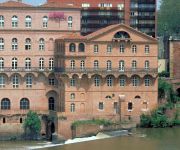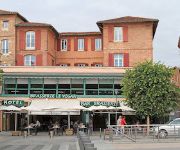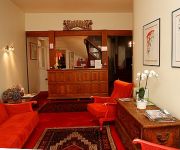Facts and Data
Webpages:
Official Unesco Page
La Cité épiscopale d'Albi
Ville d'Albi
Basis Data:
Unesco World heritage since: 2010
Size of heritage: 19 ha
- Buffer zone: 64 ha
Coordinates:
Longitude: 2,143°
Latitude: 43,928°
Summary
On the banks of the Tarn river in south-west France, the old city of Albi reflects the culmination of a medieval architectural and urban ensemble. Today the Old Bridge (Pont-Vieux), the Saint-Salvi quarter and its church are testimony to its initial development (10th -11th centuries). Following the Albigensian Crusade against the Cathar heretics (13th century) it became a powerful episcopal city. Built in a unique southern French Gothic style from local brick in characteristic red and orange colours, the lofty fortified Cathedral (late 13th century) dominates the city, demonstrating the power regained by the Roman Catholic clergy. Alongside the Cathedral is the vast bishop’s Palais de la Berbie, overlooking the river and surrounded by residential quarters that date back to the Middle Ages. The Episcopal City of Albi forms a coherent and homogeneous ensemble of monuments and quarters that has remained largely unchanged over the centuries.
Location on Map
Show bigger map on Openstreetmap
Episcopal City of Albi
The Episcopal City of Albi, located in the Tarn department of southern France, is a UNESCO World Heritage site renowned for its exceptional architectural and urban ensemble. This historic city, situated on the banks of the Tarn River, is home to the imposing Sainte-Cécile Cathedral and the Berbie Palace, which together form a remarkable testimony to the power and influence of the Roman Catholic Church in the region.
History
The history of the Episcopal City of Albi dates back to the Middle Ages when it emerged as a major center of the Cathar heresy. In response to this religious movement, the Catholic Church initiated the construction of the Sainte-Cécile Cathedral in the late 13th century. This massive fortress-like structure, with its distinctive red brick façade, was intended to symbolize the strength and authority of the Catholic Church.
During the 14th and 15th centuries, the city flourished economically and culturally, becoming a hub of trade and intellectual activity. The construction of the Berbie Palace, adjacent to the cathedral, further enhanced the city's prestige. This palace served as the residence of the powerful bishops of Albi and now houses the Toulouse-Lautrec Museum, dedicated to the works of the renowned painter Henri de Toulouse-Lautrec, who was born in Albi.
Current State
The Episcopal City of Albi stands as a testament to the rich architectural heritage of the region. The Sainte-Cécile Cathedral, with its imposing bell tower and intricate interior decorations, remains one of the largest brick structures in the world. Its unique blend of Gothic and Southern French architectural styles is a sight to behold.
The Berbie Palace, with its fortified walls and towers, showcases the grandeur and power of the Catholic Church during the Middle Ages. Today, it houses an extensive collection of Toulouse-Lautrec's works, providing visitors with a glimpse into the life and art of this influential painter.
Exploring the narrow streets and squares of the Episcopal City of Albi is like stepping back in time. The city's medieval layout, with its half-timbered houses and cobblestone streets, creates an enchanting atmosphere. Visitors can wander through the old town, discovering charming shops, cafes, and traditional markets.
Furthermore, the Episcopal City of Albi hosts various cultural events and festivals throughout the year, attracting visitors from all over the world. The Fête de la Musique, the Albi Jazz Festival, and the Festival Pause Guitare are just a few examples of the vibrant cultural scene that thrives within this UNESCO World Heritage site.
In conclusion, the Episcopal City of Albi is a captivating destination that offers a unique blend of history, art, and architecture. Its well-preserved medieval buildings, including the Sainte-Cécile Cathedral and the Berbie Palace, provide a glimpse into the city's rich past. Whether exploring its historic streets or immersing oneself in its cultural events, Albi offers a truly unforgettable experience.
Hotels and places to stay
Alchimy
Hôtel Mercure Albi Bastides
Hostellerie Saint Antoine
Hôtel du Vigan
ibis Albi
ibis Styles Albi Centre Le Theatro
Chiffre
Saint-Clair Logis
Lapérouse des Cordeliers
Hotel Le Terminus d'Albi
Videos from the area
Videos provided by Youtube are under the copyright of their owners.

















